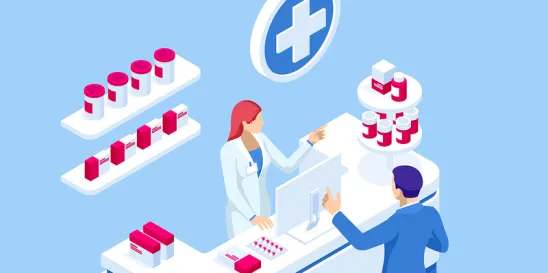On May 8, 2023, the National Health Commission of the People’s Republic of China (the “PRC”), along with 13 other government departments of the PRC, issued the “Key Highlights for Combating Corruption in the Medicine Purchase and Sale Industry and Medical Services Industry for the Year 2023” To launch a comprehensive anti-corruption campaign in the pharmaceutical industry. Subsequently, local health commissions in Beijing, Shanghai, Guangdong, Hainan, and various other provinces and cities in the PRC released notices for corrective actions specifically targeting the pharmaceutical industry. On August 15, 2023, the National Health Commission of the PRC further unveiled the “Questions and Answers Regarding the Comprehensive Anti-Corruption Campaign in the Pharmaceutical Industry,” providing additional direction and guidance on the anti-corruption campaign. All these actions collectively have had and will continue to have a profound impact on the pharmaceutical industry in China.
In this anti-corruption campaign, the anti-corruption enforcement measures most cited include:
- government’s audit bureaus conduct audit on pharmaceutical production and management enterprises;
- local hospitals conduct self-inspections and self-corrections, and increase investigation and oversight over the procurement and sale of pharmaceutical products, visits by pharmaceutical representatives, and participation in academic conferences or other related activities; and
- local health commissions, market supervision administrations, public security bureaus and other departments establish special channels to receive reports concerning corruption cases within the pharmaceutical industry.
Below we review a few key aspects of the anti-corruption campaign.
1. Key Areas of Rectification
- Corruption scenarios in pharmaceutical companies
Corruption in the sale and purchase of pharmaceutical products
- “Kickback sales”, i.e., seek deal opportunities by providing rebates to prescribers and other persons with decision-making power or influence over medicine procurement, and taking such rebates into account in advance.
- Only cooperate with a few specific pharmaceutical companies in the bidding process of medical drugs and medical supplies.
- Failure to comply with the procurement contract in a centralized volume-based procurement of medicines and medical supplies.
- Failure to record financial transactions accurately and transparently in accordance with established accounting procedures.
Corruption in the bidding process
- Divulge bidding prices during the bidding process.
- Divulge sensitive information (e.g., declarations, technical data, etc.) of other bidders.
2. Possible corruption scenarios involving hospitals and related personnel
- Unauthorized interference with the approval process of third-party medical testing organizations and other medical institutions.
- Medical staff take advantage of their position to seek personal gain (e.g., “red packets”, kickbacks)
3. Possible corruption scenarios within academic activities and conferences
- Inappropriate benefits transfer through the organization of unnecessary academic events, conferences that do not actually take place or inflating the number of attendees.
- Providing attendees with overly expensive or inappropriate gifts.
2. Impact of the Campaign
1. Stock price plummets
Several large Chinese pharmaceutical companies experienced significant declines in their stock prices after the anti-corruption campaign is launched. According to a financial media report dated August 2, 2023[i], the share price of a leading pharmaceutical company decreased by 14% in the three days, and nearly 20% in the six days, following July 31, 2023. Other pharmaceutical companies also experienced a decline of 5% to 10% in their stock prices in the three days since July 31, 2023. The pharmaceutical biological index for China market also experienced a decline of 1.63%, 0.58% and 1.38% respectively for three consecutive days since July 31, 2023. Some biopharmaceutical companies have even withdrawn or terminated their application for initial public offering on the Shanghai Stock Exchange Sci-Tech Innovation Board Market.
2. Hospitals issued rules for pharmaceutical representatives
On July 12, 2023, a hospital in Shanghai issued the “Implementation Measures for the Registration of pharmaceutical Representatives and the Management of the ‘Blacklist’ (Trial Version).” These measures outline the hospital’s commitment to implement a blacklist system for pharmaceutical representatives and establish credit records and files for pharmaceutical production and management companies. It also emphasizes that pharmaceutical representatives are strictly prohibited from offering kickbacks or any other form of inducements to hospital staff, or providing donations, grants, or sponsorships to any such individual.
Pharmaceutical companies reacted to such measures discreetly by allowing pharmaceutical representatives to “work from home” and stop visiting hospitals.
3. Government investigation of hospital directors and other personnel in the industry
On July 1, 2023, local Supervision Commission in Guangdong Province started to investigate and eventually detained the actual controller and chairman of a leading medical informatization company in connection with potential criminal charges for bribery. Although this individual has been released from detention after over one month, and has started to perform his normal job duties, the relevant cases are still under investigation.
On July 31, 2023, a publicly listed biopharmaceutical company specializing in antisera and antitoxin products disclosed that one of its actual controllers, who also serves as the chairman and legal representative of the company, was placed under investigation on suspicion of work-related crimes. This individual received a Notice of Detention and a Notification of Filing from the Shanghai Municipal Supervision Commission on July 29, 2023.
Management of hospitals are also being investigated. As of August 17, 2023, at least 184 hospital directors and secretaries were under investigation according to unofficial sources.[ii]
In addition, various medical academic conferences, including the National Annual Meeting of the Oncology Branch of the Chinese Medical Association, have been postponed after the anti-corruption campaign has been launched.
3. Compliance Systems for Pharmaceutical Companies
In light of the ongoing anti-corruption campaign, if they have not done so, pharmaceutical companies should start to conduct comprehensive reviews of their promotional activities and public bidding and build a compliance system, which encompasses anti-bribery compliance risk management. Such compliance system should cover the entire drug life cycle, from drug research and development, through clinical trials, drug registration, and drug production, to drug distribution and other related aspects, to ensure their business operations are compliant with anti-corruption rules and other legal rules and regulations. Such compliance system should also incorporate compliance risk assessment mechanism and supervision mechanism, so that non-compliance risks can be detected and investigated promptly. In addition, companies should conduct compliance training to marketing personnel regularly, so that they are familiar with conducts that are illegal and thus reducing risks of non-compliance in marketing activities, which is a focus of the ongoing anti-corruption campaign.
Zhenye Wan and Jiaqi Shao, legal interns in the firm’s Shanghai office, also contributed to this article.
FOOTNOTES
[i] https://finance.eastmoney.com/a/202308022800910115.html
[ii] http://news.cyol.com/gb/articles/2023-08/18/content_LgM0JlsG7P.html




 />i
/>i
